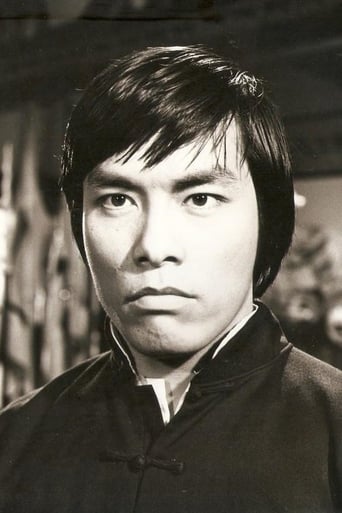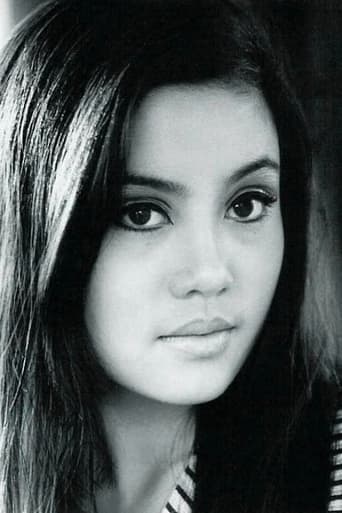Colibel
Terrible acting, screenplay and direction.
Phonearl
Good start, but then it gets ruined
GarnettTeenage
The film was still a fun one that will make you laugh and have you leaving the theater feeling like you just stole something valuable and got away with it.
Teddie Blake
The movie turns out to be a little better than the average. Starting from a romantic formula often seen in the cinema, it ends in the most predictable (and somewhat bland) way.
Leofwine_draca
Slapdash sequel, made directly after the success of the original and even released within the same year, which is unconnected to the first film, despite the return of Joseph Kuo as director and the three major cast members from the first film. There's an undeniable cheapness to the movie which is exemplified by the re-use of sets from the original to a less impressive effect here. The nonsensical plot is basically an excuse for Wong (this time an anti-hero type character who deviously changes the will of the Emperor to make himself the successor, and may be involved in the murder of one of the Royal Court), in flashback of all things, to re-enter the Shaolin Temple, spend tons of time training and once again fight the ever-impressive Bronze Men of the title - and, by God, I swear one of them is played by Alfred Hitchcock! While the two standard parts of the film that bookend the main backbone involving the golden guys are cheap and crappy-looking, once again the fights with the Bronze Men are impressive and sometimes visually stunning. This time Wong must face a variety of threats, from huge armoured bronze guards, to swordsmen, pole fights, finger-fights, gymnasts, being beaten with metal bars and the ultimate threat, a huge bronze bell which is repeatedly pushed into the fighter's back (!) and usually turns out to be fatal. My favourite test is the one in which the fighter has to sit in the middle of a circle with his eyes closed and identify the direction to which coins are thrown through his hearing alone - if he fails, a huge stone block is dropped on his head!There are also some cool traps and tricks to be traversed, my favourite being the poles which jut from opposite walls and threaten to crush you inbetween, or maybe the sections of ceiling and wall which drop or close at a moment's notice. Wong is an unlikable hero but proves himself worthwhile in the martial arts sequences, which unfortunately come too few and far between for this fan. As for Peng and Kuan, their appearances are a bit of a mystery considering they occupy so little screen time and amount to little more than cameos.
BA_Harrison
Carter Wong plays Ai Sung-Chueh, a conniving prince who uses forgery, murder and deceit to become emperor. On hearing that the Shaolin monks are about to revolt, he enrols himself at their temple, determined to learn their kung fu secrets.My DVD of 'Return of the 18 Bronzemen' describes this film as 'Old Skool Kung Fu'; reading between the lines, this means unimpressive martial arts, bad dubbing, unusually large eyebrows, wobbly music, a woman unconvincingly passing for a man, and lots of crap sound effects. Sure enough, the first half an hour or so delivers this in spades, but once the action moves to the Shaolin temple, where Carter Wong trains as a Shaolin warrior and attempts to pass the bronze-man test, things begin to get a LOT more entertaining.Fans of creaky kung fu films will have a blast watching Carter as he battles robotic monks wearing gold lamé and cardboard armour sprayed gold, wanders through booby-trapped tunnels, and fights blokes coated from head to toe in metallic paint; I couldn't get enough of this guy as he repeatedly fails the test but keeps coming back for more. Finally, as he looks set to complete the challenge, he is thwarted at the final hurdle, after which the woman who unconvincingly passed for a man earlier in the film turns up once again, unsuccessfully tries to kill him, and the film abruptly ends.6.5 out of 10, rounded up to 7 for IMDb.
unbrokenmetal
A prince has falsified the testament of the emperor in order to become heir to the throne. However, he wants to learn the secrets of Kungfu and thus become invincible. Three years he is working hard and repeatedly tries to defeat the 18 Bronzemen. When his master realizes the prince is only interested in his personal advantage, he expels him before he had the chance to pass the final test. Now the prince wants revenge and plans to kill the Shaolin monks. Apart from a quick beginning and abrupt ending, the movie consists almost entirely of the training and the challenges it involves. The detailed view on these creative tests is very interesting, though, with a touch of old Fu Manchu serials.In an awkward attempt to provide a healthy moral, apparently most international versions (in Germany: 84 minutes running time) end with the prince contemplating what he has learned (using a voice-over). Since also the beginning was cut when the testament is falsified, the cut version thus presents the prince as the hero (who legally becomes emperor and will probably forgive the monks), whereas the Hong Kong version (just over 90 minutes PAL) clearly described him as a villain who stole the throne and wants to kill all his enemies. The dark side of his character is hardly understandable in the cut version therefore. So better make sure you get the longer version if you are going to watch this.
Brian Camp
RETURN OF THE EIGHTEEN BRONZEMEN (1976, aka 18 BRONZEMEN 2) is not exactly a sequel to THE 18 BRONZEMEN (listed on IMDB as EIGHTEEN BRONZEMEN) but simply revisits the same territory and actually remakes some of the same scenes. The same three lead actors return, but not in the same roles, and only one, Carter Wong, has a starring role. (The others are Polly Shang Kwan and Tien Peng.) While it boasts some imaginative Shaolin training scenes, the film suffers from the lack of a fully developed plotline and ends abruptly as if there were a sequel waiting in the wings. It's as if a storyteller stopped after introducing the characters and setting up the premise. (The story thread is picked up to some degree in BLAZING TEMPLE, also 1976, another film in director Joseph Kuo's Shaolin/Bronzemen series.)Carter Wong plays Ai Sung-Chueh, the Fourth Prince, who uses forgery, deceit and assassination to position himself next in line for the Emperor's throne. Strangely, after his accession to the throne, he walks out on the court to go study incognito at Shaolin Temple to gain mastery of martial arts and get a sense of the burgeoning rebel movement. It seems foolish for a new Emperor to walk away for three years from a delicate political situation in which his plentiful enemies (including his brothers and the Emperor's ministers) will have ample opportunity to turn the tables on him and put someone else in power, especially when evidence of his trickery is so easy to turn up. But logic is not this film's strong suit.The bulk of the film takes place at Shaolin as Carter undergoes three years of training and attempts to graduate by fighting the Bronze Men in a series of contests of strength and skill. (The Bronze Men include men in head-to-toe robotic outfits, more gold than bronze, and men painted gold who fight with swords, sticks and kung fu.) Tien Peng and Polly Shang Kwan show up briefly in separate scenes. Early on, Tien plays the fiance of a girl Carter had rescued and is challenged by Carter to demonstrate his kung fu. Carter's defeat at Tien's hands strengthens his resolve to go to Shaolin to study. Polly, dressed as a man (although not fooling any of her fans), shows up early to fight Carter after an incident in a teahouse and then fights him once again, much later, after his Shaolin training.The Shaolin training scenes and battles with the Bronze Men take up nearly an hour of the film's running time and are beautifully staged and filmed on elaborate sets. Many viewers may ignore the lack of a strong plot structure and simply concentrate on the fights. Carter, a prolific if underrated kung fu star, is quite good here and the film serves as a spectacular showcase for his skills. He also plays a more interesting character than usual, someone driven to pass Shaolin's rigorous testing in record time, yet also ultimately committed to the Temple's destruction. The implications of these contradictory impulses, however, are never adequately explored. (Curiously, he never actually witnesses any evidence of rebel activity at Shaolin.) A Hong Kong import DVD offers a more complete version of the film than a widely available English-dubbed U.S. VHS edition which leaves out six scenes, including the final one.




